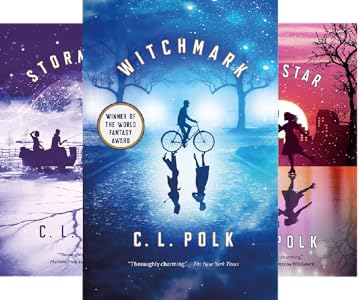2020’s Stormsong, in THE KINGSTON CYCLE is the long-awaited sequel to C.L. Polk’s wonderful Witchmark. This review may contain spoilers for Witchmark.
Witchmark followed Miles, a doctor and former prisoner of war, and a member of his world’s faerie race, the Amaranthine, as they solved a murder, uncovered a plot to assassinate Aeland’s queen, and revealed the murderous corruption that lay at the root of Aeland’s magical progress. Along the way, we met Miles’s bright, ambitious and privileged sister Grace.
In Stormsong, Grace is the main character. The second book is more of a political thriller than a Holmesian mystery, although there is a murder to be solved and its solution is high-stakes. Grace is forced to look her life, with its corruption, its exploitation, right in the face, and make some hard choices, and she is hemmed in by people who think of her as a chess piece rather than a person.
Grace was a hard character to like in Witchmark, because she kept betraying Miles. She didn’t see it as betrayal. Grace in the first book saw nothing wrong with reaching for — and taking — power if she thought she required it. That was how her world worked. At the end of that book, she confronted the reality of her country’s affluence and power, and it shocked her. She has changed, but part of the point of Stormsong is that changing for a minute, or a week, or a month, isn’t changing, and once you start, it can get harder and harder to go on.
 Grace has a lot of growing to do in this book. After some initial speedbumps, she seems to be doing quite well. After jailing Lord Hensley, Grace and Miles’s father, and his inner circle for crimes against the state, Queen Constantina appoints Grace as Chancellor, and also as the Voice, or leader, of the weather magicians who work to keep serious storms from striking Aeland. Grace learns quickly that the power of Chancellor is mostly illusory. Her former fiancé is just one of the many people who are plotting against her, while the citizens of the nation go without heat and light because of actions Grace and Miles took in the first book. Grace must also face an indomitable journalist who is determined to print the truth about Grace’s family. This second book is all about consequences, and the title is apt, because Grace faces more than one kind of storm in the course of the book.
Grace has a lot of growing to do in this book. After some initial speedbumps, she seems to be doing quite well. After jailing Lord Hensley, Grace and Miles’s father, and his inner circle for crimes against the state, Queen Constantina appoints Grace as Chancellor, and also as the Voice, or leader, of the weather magicians who work to keep serious storms from striking Aeland. Grace learns quickly that the power of Chancellor is mostly illusory. Her former fiancé is just one of the many people who are plotting against her, while the citizens of the nation go without heat and light because of actions Grace and Miles took in the first book. Grace must also face an indomitable journalist who is determined to print the truth about Grace’s family. This second book is all about consequences, and the title is apt, because Grace faces more than one kind of storm in the course of the book.
Polk does a masterful job here of showing us the habits of Grace’s privileged life, even though she is a first-person narrator. Mostly, it is through the reactions of Miles that we the reader see just how far Grace has to go. She wants to fix things, and make things better, but inherently she assumes that she and her social stratum will be protected in that process.
As with Witchmark, the writing is fluid and lovely. Most of the action of the book takes place in social settings, as befits a political thriller. In a couple of places I was confused about the magical system, which I had thought I understood. For example, I thought the energy grid was down across the nation, but Grace has a hair dryer in her house that still works. Maybe the Hensleys had an alternate energy source and I just missed it. Near the end of the book, a powerful storm is moving toward the capital, and I thought it was urgent that Grace resolve a political issue so she could reach out to an underground group of weather witches for help. After one dramatic climax, the book ends without her following through about the storm. It’s still out there, apparently, but it doesn’t seem to matter as much.
That said, I raced through this book because I didn’t want to put it down, and I had to know what happened. Grace does manage to resolve some things and save some lives, but there is plenty left for the next book. With Stormsong, Polk manages to carry forward the interesting issues and tropes introduced in Witchmark into a solid, entertaining and thought-provoking second act.




COMMENT Was I hinting that? I wasn't aware of it. But now that you mention it.... 🤔
So it sounds like you're hinting Fox may have had three or so different incomplete stories that he stitched together,…
It's hardly a private conversation, Becky. You're welcome to add your 2 cents anytime!
If the state of the arts puzzles you, and you wonder why so many novels are "retellings" and formulaic rework,…
I picked my copy up last week and I can't wait to finish my current book and get started! I…